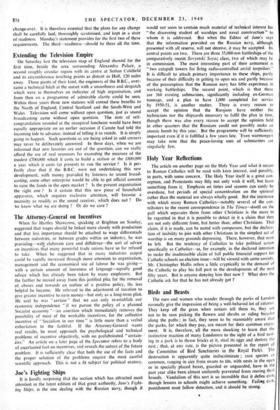The Attorney-General on Incentives
When Sir Hartley Shawcross, speaking at Brighton on Sunday, suggested that wages should be linked more closely with production and that less importance should be attached to wage differentials between industries, or between grades within an industry, he was providing—with elaborate care and diffidence—the sort of advice on incentives that many powerful trade unions have so far refused to take. When he suggested that in many industries output could be rapidly increased through more attention to organisation, management and the economical use of labour he was giving— with a certain amount of looseness of language—equally good advice which has already been taken by many employers. But the further he moved away from this justified plea for the removal of. abuses and towards an outline of a positive policy, the less helpful he became. He referred to the adjustment of taxation to give greater incentive to earn money—but only as a long-term plan. He said he was " certain " that we can only re-establish our economic independence " if we pursue the policy of a planned Socialist economy "—an assertion which immediately removes the possibility of most of the workable incentives, for the collective incentive of - Socialism in our time " is little more than a verbal exhortation to the faithful. If the Attorney-General wants real results, he must approach the psychological and technical problems of incentive objectively, with no prefabricated "certain- lies." An article on a later page of the Spectator refers to a body of ascertained fact on incentives, and reveals the nature of the future problem. It is sufficiently clear that both the use of the facts and the proper solution of the problems require the most careful scientific approach. This is not a fit subject for political oratory.


































 Previous page
Previous page